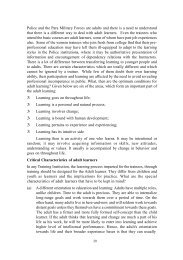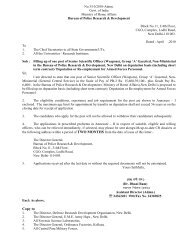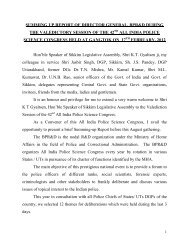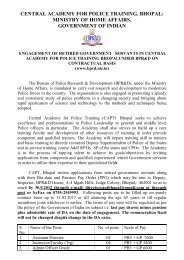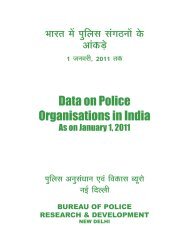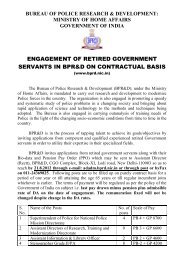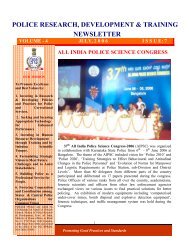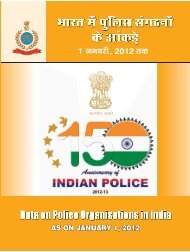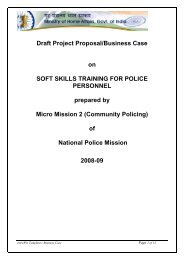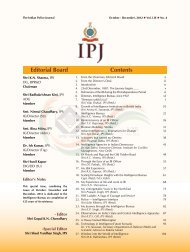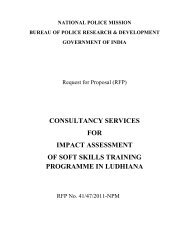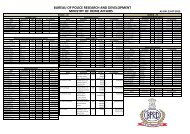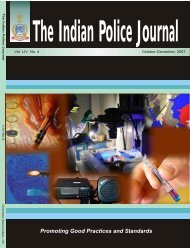April - June 2010 - Bureau of Police Research and Development
April - June 2010 - Bureau of Police Research and Development
April - June 2010 - Bureau of Police Research and Development
- No tags were found...
Create successful ePaper yourself
Turn your PDF publications into a flip-book with our unique Google optimized e-Paper software.
A Study <strong>of</strong> Burnout <strong>and</strong> Marital Adjustment <strong>of</strong> <strong>Police</strong> Personnelcreates tension, anxiety <strong>and</strong> feeling <strong>of</strong> depression,disturbed sleep that leads to low feelings <strong>of</strong> mutualunderst<strong>and</strong>ing, poor sexual relationships <strong>and</strong> createstension <strong>and</strong> conflicts between the spouse.Personal accomplishment <strong>and</strong> marital adjustmentare positively related to the feeling <strong>of</strong> superiority,high decision making attitude, having more social<strong>and</strong> political powers than others that help to keephigh personal accomplishment <strong>and</strong> high moraleamong police <strong>of</strong>ficers, which is conducive for maritaladjustment. Morgan (2002) found that senior <strong>of</strong>ficerswere more likely to report stronger feelings <strong>of</strong>personal accomplishment than younger <strong>of</strong>ficers <strong>and</strong>suggested that police <strong>of</strong>ficers who had low personalaccomplishment were more likely to consumealcohol, tranquilizers, smoke <strong>and</strong> show aggressive<strong>and</strong> abusive behaviour.It has been also observed that there is no significantdifference between burnout <strong>of</strong> sub-inspector <strong>and</strong>constables <strong>and</strong> it can be stated that sub-inspector<strong>and</strong> constables experience equal level <strong>of</strong> burnout<strong>and</strong> find job insecurity, work load, emotionalexhaustion, low personal accomplishment, <strong>and</strong>having role conflict to a large extent.There exists no significant gender difference <strong>of</strong>burnout between males <strong>and</strong> females as both thegroups experience work pressure, job insecurity,rapid transfer, public interaction, day <strong>and</strong> night shifts.While Cullen et. al (2000) <strong>and</strong> Zupan (1999) foundthat female <strong>of</strong>ficers reported greater burnout thanmale <strong>of</strong>ficers because <strong>of</strong> low social support, jobinsecurity, job autonomy, time pressures at work,<strong>and</strong> work-family conflict.Male police <strong>of</strong>ficers were found to have low maritaladjustment, while female <strong>of</strong>ficers had high maritaladjustment because females are more adjustableby nature than male. It has been also found thatfemale police personnel face less job responsibilitiesat work place <strong>and</strong> work load, no frequent changes inwork shifts <strong>and</strong> transfers. (Cruse, D. & Rubin, 2003).Constables feel more marital adjustment than subinspectorbecause sub-inspectors have moreresponsibilities, decision making workload,pressure <strong>of</strong> seniors than constables while constablesface less pressure <strong>of</strong> seniors.Conclusion <strong>and</strong> Future ImplicationsOn the basis <strong>of</strong> the study, it can be concluded thatthere is negative relationship between burnout <strong>and</strong>marital adjustment. It has become important to copeup with burnout as it leads to chronic physical <strong>and</strong>psychological consequences. As person feelsemotionally drained, it generates unrealisticthoughts, have distorted self perception, frustration,hopelessness, detachment, isolation, sadness <strong>and</strong>irritability. These factors lead to reduced interest infamily matters, reduced communication <strong>and</strong> mutualtrust which creates tension <strong>and</strong> conflict in family<strong>and</strong> between spouses.Thus, it can be suggested that there is need <strong>of</strong>appointment <strong>of</strong> mental health experts, stressreduction <strong>and</strong> intervention programmes (yoga <strong>and</strong>meditation), <strong>and</strong> the peer support program shouldbe started in the police academy <strong>and</strong> in local policestation, to reduce the stress among policemen <strong>and</strong>their family. Religious participation <strong>and</strong> beliefs,spending time together, social <strong>and</strong> family support<strong>and</strong> marital therapies can help the spouses to reducethe marital disputes <strong>and</strong> burnout which include loss<strong>of</strong> affection, communication problems <strong>and</strong> extramarital affairs.Proper psychological tests must be developed forthe assessment <strong>of</strong> personnel's stress levels <strong>and</strong>appropriate therapies should be used where the<strong>of</strong>ficers can combat various stressful situations. Bi<strong>of</strong>eedback must be followed up to inform the personnelconstantly about the physical <strong>and</strong> psychologicalchanges during stress, for example the intensity <strong>of</strong>tension in muscles, the body temperature, heart rate,etc.ReferencesAnn C. Davidson, Ellen Berah <strong>and</strong> Simon Moss(2006): “The relationship between the adjustment <strong>of</strong>australian police <strong>of</strong>ficers <strong>and</strong> their partners”.Psychiatry, Psychology <strong>and</strong> law, (13) 1,41- 48.Anson, R.H. Bloom (2000): <strong>Police</strong> stress in anoccupational context. Journal <strong>of</strong> police science <strong>and</strong>administration, 16, 229-235.56 ➢ The Indian <strong>Police</strong> Journal Vol. LVII-No. 2, <strong>April</strong>-<strong>June</strong>, <strong>2010</strong>



